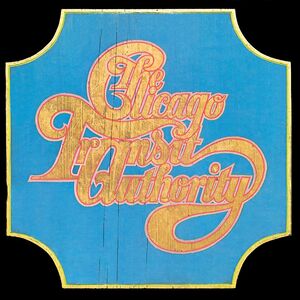Chicago Transit Authority (album)
| Chicago Transit Authority | ||||
|---|---|---|---|---|
 |
||||
| Studio album by Chicago Transit Authority | ||||
| Released | April 28, 1969 | |||
| Recorded | January 27–30, 1969 | |||
| Studio |
Columbia Recording Studios (New York, United States) |
|||
| Genre | ||||
| Length | 77:43 | |||
| Label | Columbia | |||
| Producer | James William Guercio | |||
| Chicago Transit Authority chronology | ||||
|
||||
| Singles from Chicago Transit Authority | ||||
|
||||
| Professional ratings | |
|---|---|
| Review scores | |
| Source | Rating |
| AllMusic | |
Chicago Transit Authority is the self-titled debut album by the Chicago-based rock band Chicago Transit Authority, later known as Chicago. It was recorded and released in 1969.
At the band's 1967 inception, it was initially called "The Missing Links". Then, (according to Robert Lamm on an episode of In the Studio with Redbeard devoted to the making of the album) the name was changed to "The Big Thing" (occasionally performed in areas outside Chicago and Milwaukee as "The Big Sounds" due to some venues complaining about the double entendre that the name "The Big Thing" also alluded to), before adopting the name The Chicago Transit Authority when the producer James William Guercio took them on in 1968. Their trademark was fusing brass and jazz with a soulful rock and roll feel and Guercio felt that this would prove successful, lobbying for his label to give them a try.
Chicago Transit Authority were signed to Columbia Records late in 1968 and recorded their first album in late January 1969. While Guercio had recently produced Blood, Sweat & Tears' second album (which proved to be a huge smash), he did so to raise capital for his band. By the end of The Chicago Transit Authority's sessions, it was clear that the album would have to be a double. Skeptical, as the band had no track record, Columbia only agreed to the concept if the group would take a royalty cut.
In their original incarnation, keyboardist Robert Lamm, guitarist Terry Kath and bassist Peter Cetera all shared lead vocals, while James Pankow, Lee Loughnane and Walter Parazaider handled all brass and woodwinds (trombone, trumpet and saxophone, clarinet and flute respectively) and Danny Seraphine played drums and likely doubled on percussion. Lamm, Kath and Pankow were the band's main composers at this time. Kath's prowess as a guitarist was so strong that Jimi Hendrix became an avowed fan of Kath's playing. According to the album's original liner notes, the solo performance of Kath on "Free Form Guitar" was created without the use of any pedals. In a nod to Hendrix's guitar expressionism (Hendrix most notably used wah and fuzz pedals), Kath instead plugged directly into his studio amplifier and improvised the entire track in one take for the purpose of pure tone. "Free Form Guitar" is also noted as being another influence on the genre of noise music.
...
Wikipedia
